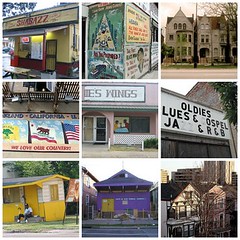"A Rake's Progress," Part One: Q&A with Robert W. Harwood

Of all the contacts I’ve made since posting the first version of my “St. James Infirmary” essay online in 2003, none has been more consistently amazing than Robert W. Harwood, who knew a tremendous amount about the song and its history, and even wrote a self-published book on the subject, called A Rake’s Progress. This was a personal and non-commercial project, that worked in tandem with a CD compilation that he put together for friends. It’s a fascinating work that I’m lucky enough to have a copy of.
The good news is that he’s at work on a second (revised and expanded) edition of the book, which you will learn about here. Bob was good enough to answer a series of questions that I sent him about his research, and the book, and I will devote this week to that email interview.
Here is Part One.
Q: Let's begin with the obvious questions. A Rake's Progress, as you note in the book’s introduction, is about "the evolution of a song." What was your entry to this, as a listener? That is, what version of the song (or songs) was the one you knew and/or got curious about first?
A: Bob Dylan and Lou Rawls! Around 1992 a friend sent me a tape of previously unreleased Dylan songs. I found out later that these came from Columbia's The Bootleg Series Volumes 1-3. (Should any record executives out there feel concerned, rest assured that I later bought the CD.) The song "Blind Willie McTell" immediately caught my attention. I never tired of listening to it. Some years later I was playing a newly bought compilation CD of jazz vocals, and Lou Rawls came over the speakers singing "St. James Infirmary." This was the first time I'd heard “SJI.” Rawls sings his own introduction, "When will I ever stop moaning / When will I ever smile / My baby went away and she left me / She'll be gone for a long, long while" and so on. He then gets into the song proper, and at this point I shot up from my chair, exclaiming aloud "That's ‘Blind Willie McTell’!!!" For some reason that I can't explain today, I became quite excited. There was nobody else in the room. The Dylan lyrics, "I'm standing by the window of the old St. James Hotel / and I know no one can sing the blues like Blind Willie McTell" came to mind, and that started it.
I have since played this Rawls song to friends, and they often don't recognize the similarity.
At what point did you decide to write A Rake's Progress? Was it a way to organize informal research, or did the decision to write something come first, and then the research got ramped up as a result?
A bit of both, actually. I plunged into trying to find out more about the song -- and about the ground from which the song grew -- out of simple curiosity. It so happened that I was able to gather quite a bit of information, and had become intrigued by the question, "How did Joe Primrose/Irving Mills gain credit for the song's authorship?" My wife, Pam, encouraged me to start writing, and gradually I began to put together an essay of sorts. This led, of course, to further research. I found, for instance, that many of our assumptions about the arising of the blues are faulty. That the advent of recorded music dramatically altered the process of musical evolution. That the path I was exploring had many crossroads. In an appendix I wrote, "The problem is that, often, the closer one gets to something the less distinct it becomes. Or, it becomes part of a larger landscape, the puzzle becomes more complex and one has to select which areas to investigate . . . I was sometimes left with the impression that, had I been able to search all the pathways that opened up during my exploration, the result would have been nothing short of a history of the world. Which is, of course, impossible."
So, the essay became something else. And Pam, who works as a graphics artist for a university book publisher, began to muse about actually creating a book. I created a cover illustration, Pam designed a cover and formatted the text. The book was kept short (about 70 pages), as we were concerned about the cost of printing. And we finally did print forty copies, most of which were given to family and friends as gifts. By this time, you and I were exchanging letters, some of our discussions found their way into A Rake's Progress, and you were the first person to whom I sent the completed book.
I am working on a revision, considerably expanded. The aim is for the fall of this year. Again we will publish it ourselves. We are considering offering it for general sale and so, because of copyright issues, won't be able to include an illustrative CD. If anyone is interested in purchasing this book when it's finished, they can send me a note at robertharwood@rogers.com. I could then inform them when it's ready. As we'll be publishing it ourselves, I should be able to keep the cost fairly low.
Tomorrow: Part Two, the early recording industry, the blues, and other important contexts.



<< Home